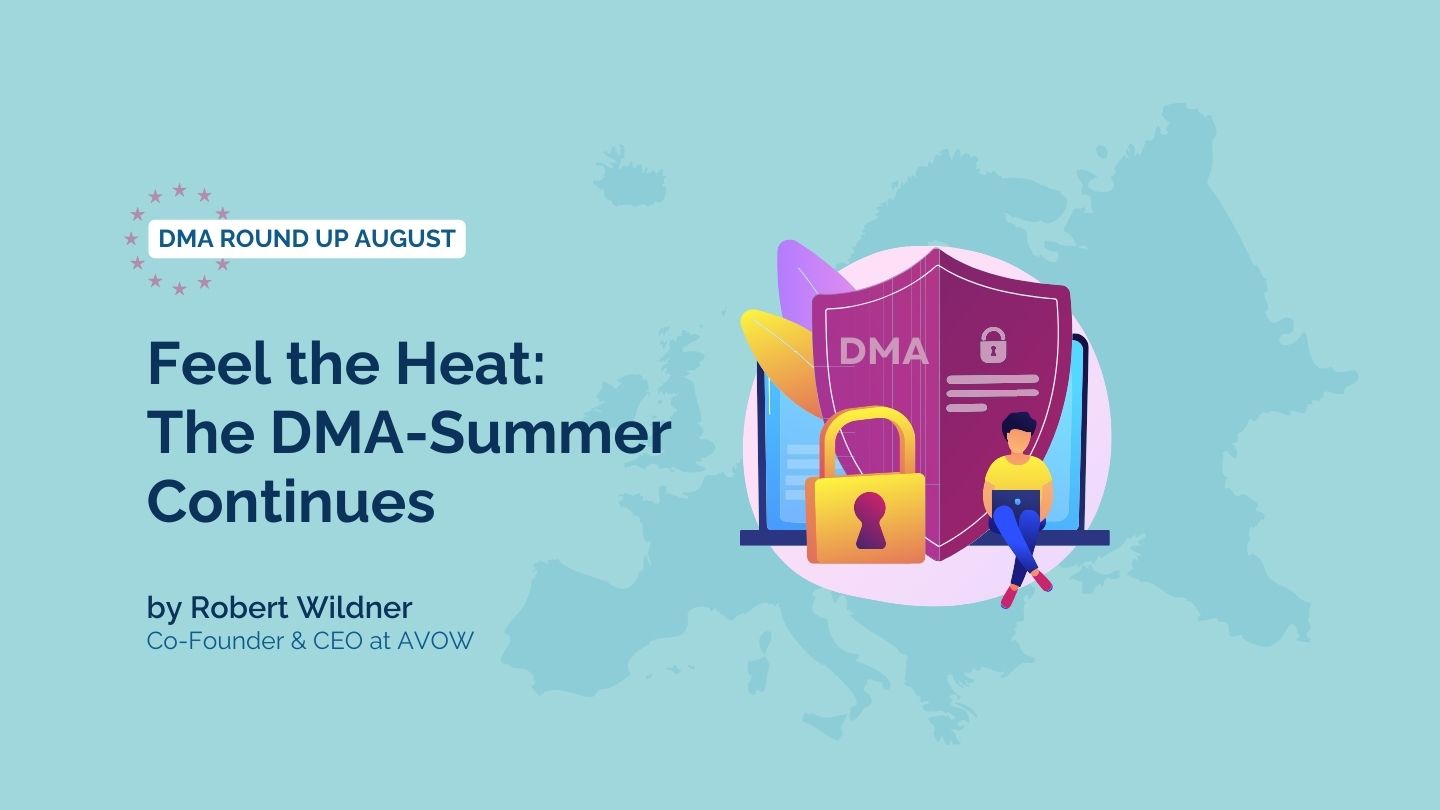This article was originally published on LinkedIn. Robert Wildner, CEO of AVOW, highlights the EU’s tough stance on the Digital Markets Act (DMA) affecting Meta, Apple, Google, and TikTok. He notes significant regulatory actions, including Meta’s “pay or consent” model scrutiny and Apple’s concession on app store rules, while also addressing the DMA’s impact on AI deployment and technological progress.
First, some bad news. Summer is nearly halfway over. It must be time to hit the beach, right? Not if you’re in the app economy. As I reported last month, the EU has been flexing the muscles behind its Digital Markets Act (DMA), the policy it launched in March designed to put an end to the monopoly enjoyed by certain tech giants. From then on, Europe’s lawmakers said, companies such as Apple and Google had to let others get a piece of the pie. Unsurprisingly, things haven’t been straightforward. But few expected Europe to get as tough as it has.
July was a good example. From Meta facing the full weight of the DMA’s jurisdiction to Apple, Google, and TikTok struggling with the new reality for their activities in Europe, it’s been an important month for the legislation. Indeed, while I’ve previously documented critics who have suggested that the EU lacks the teeth to enforce its new law, what we’re seeing is the opposite. So let’s get into it.
Photo by Rohit Tandon on Unsplash
1.The EU gets tough on Meta
Since I last updated this blog, the biggest story has been that, in a preliminary investigation, the EU found that Meta’s “pay or consent” user model breached the DMA. Last year, Instagram and Facebook, owned by Meta, told users that, in order to continue using these platforms they either had to agree to their data being tracked or else pay a subscription fee. According to the EU, this goes against its anti-steering laws. Now, Mark Zuckerburg’s company has until September 1st to comply or else potentially follow Apple in facing a penalty of up to 10 percent of its global profits.
It’s an unambiguous rejection of the unfair advantage that some of Silicon Valley’s biggest names have, until now, been accustomed to. What’s more, it demonstrates that the EU means business when it comes to compliance: a win-win for both anti-monopoly campaigners and data privacy activists alike. Naysayers should therefore take note. The DMA really isn’t just another empty piece of “Eureaucratic” lore.

Photo by Daria Nepriakhina 🇺🇦 on Unsplash
2. Apple, Google, and TikTok grapple with the DMA
As mentioned, however, it wasn’t just Meta that felt the heat in July. Apple, Google, and TikTok were under pressure too. In terms of the iPhone manufacturer’s monumental fight to prevent the mobile game Fortnite from returning to its App Store (after kicking it off for having the temerity to include in-app purchases…), this saga appears to be over. Following threats from the game’s developer, Epic, to escalate this case to the EU, it now looks certain that the title will be available on iOS soon. In addition, Apple also finally rolled over in its attempt to block third parties using its Apple Pay technology. Whoever said miracles are impossible?
Next up: Google. As regular readers know, the search engine behemoth has dropped off the DMA-map these last few months, appearing to have meekly complied with the EU’s demands. Well, that doesn’t appear to be the full picture. As Forbes exclusively reported last month, Google has allegedly been scraping data from users. According to the news platform, Google has been using Chrome to collect device and performance data—a possible breach of DMA rules. Simultaneously, the European Commission is also looking into whether Google’s AI deal with Samsung prevents other companies’ chatbots from appearing on Samsung smartphones—another potential DMA no-no.
And then there’s TikTok. Recently it tried to wiggle out of its designation as a DMA-gatekeeper by appealing this status, but last month the EU rejected its plea. Along with Apple, Google, Meta, Microsoft, and others, it will now have to obey the EU’s anti-steering standards. In all, it’s another resolute decision. But can Europe keep this level of enforcement up? Time will tell, but right now things are positive.

Photo by Thom Holmes on Unsplash
3. Ghost in the machine: the EU locks horns with AI
Finally, the major DMA-related story in July relates to artificial intelligence. As I wrote in my last update, Apple is withholding its new AI-powered iPhone tech over regulatory concerns about the DMA. Well, now Meta is following suit, withholding its generative AI tools in the EU until further notice too. Given that both companies are also facing compliance investigations, certain outlets are speculating that there may be a link between these two things. Is there really a pattern?
Whatever the case, some industry professionals might be getting the impression that the DMA is blocking technological progress, which is never a good thing. On the other hand, many leaders also believe that the slow deployment of consumer AI in Europe isn’t necessarily bad. Recently, the UK, the US, and the EU issued a joint statement on generative AI, urging caution before allowing tech companies to unleash it on the market. Moreover, France has also suggested that AI-powered platforms might need to be policed under the DMA too. So who’s right?
For me, Sarah Wilson at BuzzHint strikes a good balance. In her recent article, she argues that while AI is good for marketing—and therefore good for economic growth—it’s also a double-edged sword, “where there is a risk of entrenching the market power of platforms that can effectively exploit certain technologies.” The solution? A careful balance, and one that, in my opinion, is immensely achievable via the DMA, which can act as an effective arbiter of what’s acceptable in the Bloc.
And once again, that’s it for another edition. I look forward to greeting you again in September.
—Robert.
This article was originally published on LinkedIn.
About the Author







